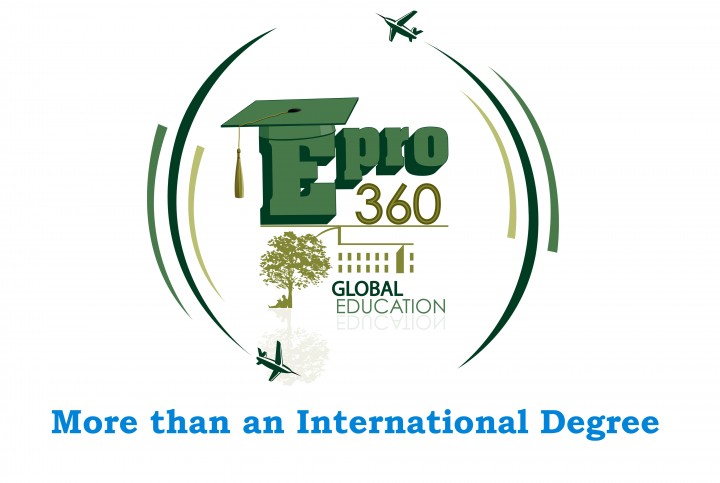In spite of stricter immigration laws and ever-increasing tuition fees, the United States is still the most attractive destination for international students – by far. In 2013 alone, more than 800,000 freshmen started their college career at an academic institution in the U.S. Three international Lindenwood University students had this in mind when they founded Epro 360, a startup that helps potential students from around the world make their dream to study in the United States become a reality.
Embodying the entrepreneurial spirit many foreign-born have, the students offer a service they once needed themselves. Epro 360 is the brainchild of Oswaldo Chavez, who saw a need to streamline the process of getting an education in the U.S. “I went through a lot of frustration applying to American universities,” explains Chavez, who studies international business. He teamed up with Jonas Kehrbaum and Francisco Galvez, who all started as international students at Lindenwood. While Chavez and Kehrbaum are still studying in St. Charles, Galvez graduated two years ago. Although Epro 360 is not even a year old, it has already attracted a loyal group of benefactors and patrons. “I never expected to find support so easily,” says Kehrbaum. “People seem to gravitate towards the idea.”
Tom Huling is one of those who sees promise in Epro 360. As a successful business owner, he mentors the trio. More than an international degree Epro 360’s mantra is that while going to college in the U.S. has undoubted benefits, it is only one piece of the puzzle. That’s why Epro 360’s mission does not end when they successfully placed a student at an American university. As a matter of fact, that’s when it starts. “There’s a lot of agencies out there that help you come to the U.S., but you don’t get mentorship or a strong support network”, says Kehrbaum, who came to Lindenwood in 2010 to study anthropology. 
Epro 360’s main service is helping foreign students find a U.S. university, facilitate the application process, and attain scholarships from one of Epro’s partner institutions. However, Epro 360’s portfolio also includes educational mentoring, career coaching, resume revising, and personal growth opportunities. “These additional services are free for one year,” explains Chavez. After that, clients are charged ten dollars per month. For $500, the startup also offers internship placements. One of Epro 360’s partnerships is the Semester At Sea program, which allows students to study on a floating campus and travel to up to 13 countries in one semester.
Being an alum himself, Kehrbaum says Epro 360 can facilitate the application process and help students get scholarships for this unique opportunity. Attacking what looks like a niche market, the idea behind Epro 360 takes into account that getting there does not guarantee getting ahead. Says co-founder Kehrbaum: “There is this false belief that once international students come to the U.S. they are academically pretty much set for the rest of their lives. People think a U.S. degree gives them everything they want, and they can get any job. In reality, that’s just wrong.”
The statistics favor the idea, given the fact that 20 years ago, having studied abroad made one stand out from the crowd. Today, it is the normality. “Academic inflation means that a college degree itself is not worth as much as it used to be, because today having one is not the exception but the rule. The value that Epro 360 adds to the degree helps not only international students but students from the U.S. to get ahead of their competition,” states co-founder Kehrbaum.
Foreign-born talent means economic opportunity for the U.S.
In April, Chavez and Kehrbaum met with St. Louis Mosaic Project Director Betsy Cohen in the World Trade Center St. Louis to network, discuss Epro 360’s strategy and talk about a potential partnership. Cohen says the rationale of Epro 360 aligns with the mission of the Mosaic Project as both ventures seek to attract and retain international talent. Cohen says having more foreign-born talent means economic opportunity for the United States. “Immigrants in the St. Louis region are better educated, have more advanced degrees, and are 60 percent more likely to start a business than native-born.” She also says the same trend can be seen nationwide. Although immigration law and limited number of working visas makes staying in the U.S. after graduation difficult, the founders of Epro 360 believe that the interest in studying in the U.S. is only going to increase.
For now, they are launching Epro 360 in Ecuador, Peru, Spain and Mongolia. “We are actively attacking these countries with our ambassador system,” says Chavez. Epro 360 ambassadors are liaisons who live in the countries and refer students to the company. Establishing a “highly trained base of ambassadors” is one of the next goals of the team. Another one is to have a “fully functioning kick-ass website” with SEO so effective that those looking for an agency will find Epro 360 on the first results page on Google anywhere in the world.
While these short-term goals seem to be attainable, the long-term plans are a lot more ambitious. The founders of Epro 360 want to turn their startup into an “internationally recognized brand” that is known as the agency that not only sends students abroad but also provides a career network and personal growth opportunities. “In five years, we want to be successfully established in 20 countries – minimum,” says Chavez.
Inside an international student startup
When he was younger, Chavez’ father told him doing business with others is risky. “My dad always said: if you want to be successful in something, do it by yourself. However, from my personal experience, there is more potential if you have partners.” Chavez says a team is more than the sum of its parts. “When you start your own business alone, there is a high risk that you will only get to a certain point of growth, because you don’t have the required skills.” Every team with a mission needs guidance, and Epro 360 is no exception.
Says Kehrbaum: “Writing a business plan was important in terms of getting on track and having the same vision. Execution-wise, however, it wasn’t necessary.” Chavez says just having the idea in mind is not going to help you. “Investors always ask for a business plan. It is important for pitching the business to other people.”
Currently, the team is looking for somebody to help them with securing funding. “We’re planning to hire somebody to apply for grants and awards,” says Chavez. This summer, Chavez will travel through Ecuador and South America to talk to investors, while Kehrbaum will use his time in Germany to promote Epro 360 in his home country before he returns to the U.S. in August. The team is excited about having found both a need and a niche. “Failure is not an option,” says Chavez. Epro 360 and its founders certainly exhibit many traits successful entrepreneurs need: grit, an unreasonable aversion to failing, and the willingness to step out of their comfort zone. It all started years ago when they decided to follow their heart and study in a foreign country.
For more information go to Epro360.com or send an e-mail to [email protected].







